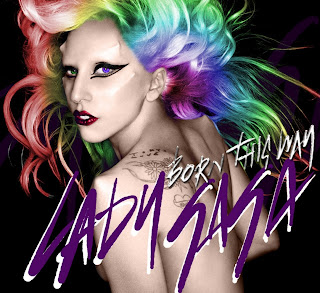Wednesday, April 6, 2011
In Defense of Lady Gaga and "Born This Way"
Do you know what the Internet needs today? A blog post about Lady Gaga. And "Born This Way!" Man, where are those articles?
Gaga! Oh-la-la! What's she up to now? Apparently pissing off a great deal of people. "Born This Way" shot to the top of iTunes charts the first week of its release, breaking records as the fastest number one single since iTunes began.
This chart-topper is not without criticism. Fans and foes alike have pointed out the obvious Madonna sound comparisons. But that? Yawn. I'll save that for someone else. (Hilariously, the most apt sound comparison seems to be Powerline, of A Goofy Movie fame.)
The lyrics are another matter; the Internet world has pointed out that Gaga's use of the term "Orient" and "Chola" are not campy pop, but offensive racism. And the opening lines of, "Whether you love him or capital H I M" isolate lesbian fans, particularly lesbian fans who are agnostic, atheist or believers in capital H E R. An anthem for the LGBT community that neglects the L, possibly half of the B, (and, some argue, the T) isn't really an LGBT anthem. (As we know from this post, Gaga is a strong supporter of LGBT rights. This oversight doesn't quite fit with her activism.)
The ableist language of the title also rubs the wrong way: If God (of the H I M variety) makes no mistakes, what of those born with mental illness, or chronic pain, or debilitating conditions? There's a cruelty in the lyrics to assume that everyone is as able-bodied and healthy as Gaga. Grand theologian Gaga is not.
But. (And there's always a but with this one!) With the knowledge that Gaga tackles a complex topic with overly simplistic lyrics that can be problematic, note that there is a positive to this.
First, Lady G penned these words during this past year, and this past year has seen an increase in awareness for the LGBT youth in the media -- particularly in Dan Savage's It Gets Better campaign. It's not a stretch of the imagination to think that Gaga wrote this with gay youth in mind. Admittedly, it does cater more to the male side of LGBT youth, but if her inspiration came from the youth suicides in the media the male favor may be intentional.
Secondly, the idea that sexual fluidity and identity are not a product of nurture, but nature, is one that still needs to be pushed. And even though the Lady sings she must, "be myself, respect my youth," one hopes that it is the older demographic that takes in this message. Who listens to the radio? Everyone. Whether we want to hear it or not, "Born This Way" is blaring out over loudspeakers in the malls and car stereos across the States. It turns into a "Gay Rights 101" song, reaching those who still believe that being gay is a choice, a sin, and something that only happens to hairdressers in Manhattan.
If anything, the overly simplistic message of being born gay can reach ears of those who would never consider homosexuality beyond what outdated bigotry and harmful stereotypes tell them.
Third, very simply: How many pop stars are singing explicitly about gay rights other than Gaga?
A grand total of none. Really. If you can think of one, please correct me. Top 40 music is not that diverse.
Yes, for those past our 101 courses, the message may be marred in problems, language faux pas, racism and is patronizing to, if not exploiting, the LGBT community. But for the rest of the populace? It may just the eye-opener they need. A tiny seed planted that can grow with the right nurture and education. And in talking about the problems of the song, we can make sure Gaga's oversights are not our own. We may be born ignorant, but we don't have to stay that way.
(UPDATE: After posting this article, I experienced some computer problems that prevented me from changing the working title, "The Silver Lining of Lady Gaga and 'Born This Way'" -- a title that really did not fit. The title has now changed, in addition to a few edits for a cleaner copy. Thanks.)
Subscribe to:
Post Comments (Atom)


0 comments:
Post a Comment